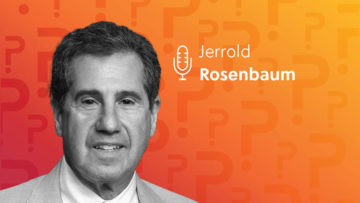From Harvard Magazine:
 Nancy Kathryn Walecki: So first of all, most people probably think of psychedelics in the context of the 1960s countercultural movements, when they were being used recreationally. So is using psychedelic drugs in psychiatric treatment a new idea?
Nancy Kathryn Walecki: So first of all, most people probably think of psychedelics in the context of the 1960s countercultural movements, when they were being used recreationally. So is using psychedelic drugs in psychiatric treatment a new idea?
Jerrold Rosenbaum: No, it’s not a new idea. The discovery of the psychoactive properties of psychedelics goes pretty far back. The iconic molecule LSD was synthesized by scientists, Albert Hofmann in 1938, working for Sandoz. And it was really due to a inadvertent contact with the substance—he hadn’t determined what it would be good for—that he actually absorbed some and had these remarkable experiences, visual and perceptual changes, and he knew he had something interesting. There was a fair amount of research going on with LSD really into the 60s as a serious exploration of what it might mean for patients with psychiatric disorders. And it was explored as a model of psychosis, as a potential treatment for psychotic disorders, and there was some recognition that it might play a role in treating addictive disorders. And so, serious scientists really in the early 60s at our National Institutes of Health, were looking at these LSD and related substances. The patent life for LSD ended and Sandoz stopped making it, but it turns out to be a pretty easy compound to manufacture. And so, home labs came into existence and LSD made its way into non-medical use and non-research use, and there was a fair amount of interest in the experience that LSD generated and it became sort of a hallmark of, as you pointed out, the counterculture population, particularly with disaffected youth in the 60s, triggered by political events, the Vietnam War and other frustrations with society. And, as you know, a Harvard professor or Harvard faculty member, Timothy Leary, was enthusiastic and was encouraging people to use it, that the reality or the alternative experience from day-to-day reality that these substances afforded was viewed as preferred. And so he encouraged people to tune-in turn-on, dropout, and many did, setting up alternative lifestyles. But it was also associated with the protest movement against the Vietnam War.
More here.
